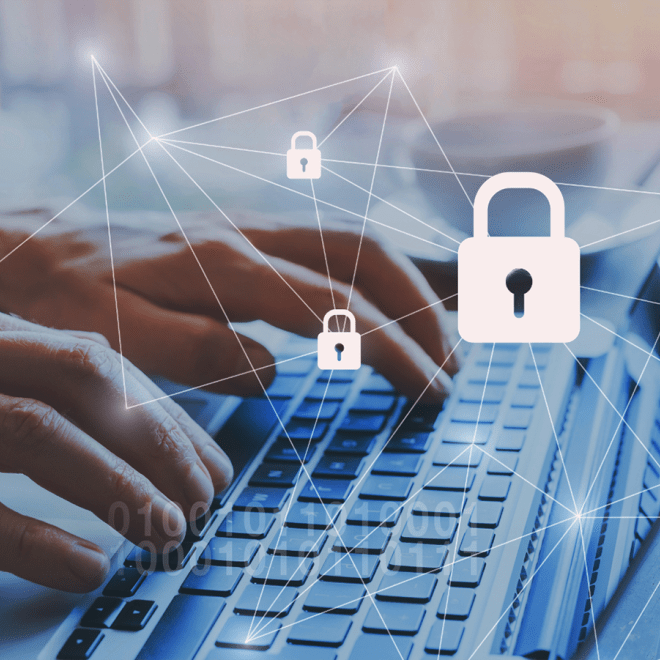What Does a Career In Cyber and Information Security Look Like?

Cybersecurity is a field that is accelerating rapidly. As more and more cybersecurity attacks occur, the demand for professionals adept in preventing and protecting against these attacks rises.
Cybersecurity professionals protect data, information, digital assets, and more from cyberattacks. These professionals develop and implement the tools needed to save data from families, organizations, communities, and governments safe.
The Numbers
With a Master of Science in Cyber and Information Security, you enter a thriving career field with the right skills and theoretical knowledge to set you apart.
Expected Career Growth Trajectory
2021–31
Cybersecurity Job Openings
Average Base Salary
M.S. Cybersecurity Graduates
Careers in Cybersecurity
There is no shortage of career opportunities or jobs available for M.S. Cyber and Information Security graduates. Cybersecurity professionals work in almost every field and sector - both public and private – including: banking, government, healthcare, technology, insurance, education, and more. There are a variety of careers within this field that you can pursue after earning an M.S. in Cyber and Information Security.
Entry-Level
• Cyber Crime Analyst
• Cybersecurity Specialist
• Incident & Intrusion Analyst
• IT Auditor
Mid-Level
• Cybersecurity Analyst
• Cybersecurity Consultant
• Penetration and Vulnerability Tester
Advanced-Level
• Chief Information Security Officer (CISO)
• (Cyber) Security Architect
• (Cyber) Security Engineer
Building a Career in Cybersecurity
To build a strong career in cybersecurity, there are several skills—both technical and soft—that you’ll need to succeed. A base knowledge of programming and networking is essential. You can demonstrate this knowledge through transfer coursework, undergraduate studies, work experience, or industry certifications. If you don’t have a background knowledge in programming and networking, St. John’s offers conditional admission where candidates can make up for these deficiencies by taking undergraduate, graduate, or other comparable courses. Candidates may also meet this requirement with certifications, bootcamps, or online certificates—given the content is equivalent to approximately 40 hours coursework on similar topics.
Besides programming and networking, there are other skills areas you need to consider when pursuing a career in cybersecurity:
Secure Coding and Secure Software Development Lifecycle (sSDL)
Secure software and secure scripting design knowledge helps you understand how software and applications are created—as well as how cyber attackers can exploit them. Additional languages such as Python, Powershell, Bash, Shell, SQL, C, C++, Java, Perl, KQL, Ruby, Kotlin, and Javascript make you a more desirable employee after graduation.
Building and Deploying Secure Applications
By understanding how software and applications are built, configured, maintained, and exploited, you are better prepared to test and remediate vulnerabilities during the secure Software Development Life Cycle (SDLC).
Architecting, Deploying, and Managing Secure Systems
Operating and embedded systems are critical for cybersecurity professionals to understand. By learning the unique aspects of desktop, embedded, and mobile systems, you can apply what you learn across multiple systems.
Emerging Trends in Cybersecurity
Cybersecurity is a field that is always changing. With each new technology and development, the needs and requirements evolve. With an advanced degree in cybersecurity from St. John’s, you stay on top of the ever-changing aspects of the laws and regulations affecting the industry, as well as cybersecurity evolutions and technology innovations.
Mobile and Cloud Computing
Cybersecurity focusing on mobile and cloud computing is dedicated to security and protecting these cloud computing systems. Mobile and cloud security professionals keep data private and safe across a number of online-based applications, mobile operations systems, and infrastructures.
Digital Forensics and Risk Management
Digital forensics focuses on cyber crime once it has occurred. They work to recover data with legal compliance and identify the responsible party. Managing risk occurs at all phases of the secure software/system development lifecycle (i.e. from architecting a system, through responding to incidents, until the timeframe a system is decommissioned.)
Machine Learning and Artificial Intelligence
As the number of challenges facing cybersecurity professionals grow, machine learning can be leveraged to scale security solutions and detect attacks in advance.
Pursuing an Advanced Degree in Cyber and Information Security
With an advanced degree, you master the skills that you need to succeed in the cybersecurity industry. Additionally, you develop a network of professionals and make yourself a more desirable employee—especially for the specialty roles that are difficult to fill.
St. John’s University leads the way in innovation in this field by staying ahead of the emerging trends and incorporating these trends into our curriculum. Our faculty and students are involved in some of the most cutting-edge research and featured in prominent publications worldwide.





